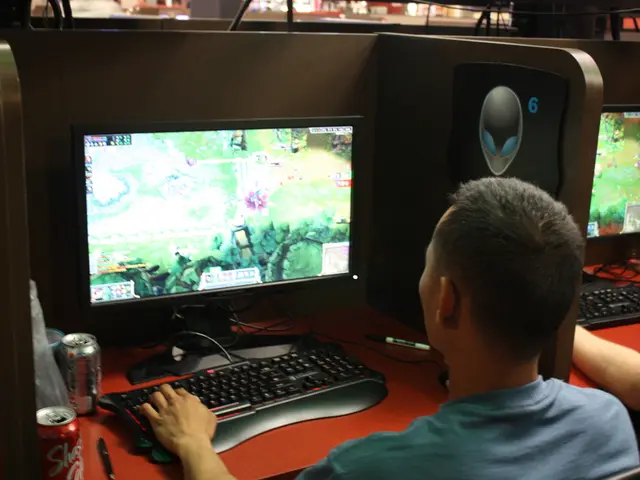Poker's Transformation in the Digital World
=======================================================================================
In the realm of poker, the digital age has brought about a seismic shift, transforming the way players approach the game and interact with one another. From the World Series of Poker streamed live online to international friendships forged in virtual poker rooms, the landscape of this timeless card game has never been more dynamic.
Players now harness a variety of tools to simulate scenarios and refine their strategies, improving their skills and staying ahead of the competition. Artificial Intelligence (AI) and statistical models have become indispensable in crafting effective poker strategies, enabling players to make data-driven decisions and optimize their gameplay.
Online poker platforms have introduced mobile apps, chat features, and community forums for seamless interaction, fostering a lively online poker culture. Gathering at a virtual table is now akin to meeting at a favourite card room, with the ability to seek advice or engage in lighthearted banter enriching the overall experience.
The use of powerful programs like PokerTracker and Hold’em Manager allows players to collect and analyse every hand they play, providing detailed statistics on tendencies such as aggression, tightness, and raise frequency. This scientific approach to poker strategy has made modern players more analytical and strategic, constantly reviewing data to refine their approach.
Advanced AI poker bots, such as Libratus and Pluribus, analyse millions of scenarios and adjust strategies dynamically to be less exploitable. These AIs, unlike human players, remain emotionally detached and calculate expected values precisely, outperforming players prone to psychological errors. Simplified versions of these AI strategies have become commercially available to online players, democratising access to cutting-edge poker know-how.
In online environments, technology reduces reliance on physical tells and body language, shifting focus to statistical tendencies and pattern recognition. Virtual reality (VR) innovations aim to blur lines between digital and physical spaces, opening new immersive social interactions at virtual poker tables.
Cryptocurrency integration is another significant development in the online poker world. Platforms like Americas Cardroom have introduced crypto-based ecosystems offering faster transactions, better security, enhanced privacy, and new engagement avenues such as large crypto jackpots. This has attracted a broader demographic of players and influenced how they fund and participate in poker games.
The use of Independent Chip Model (ICM) calculations, hero checks, and other advanced concepts increasingly relies on computational support rather than intuition alone. Players now need to incorporate quantitative models and computer-derived insights into their postflop and endgame decisions.
The future of online poker promises to remain connected to the community that makes the game dynamic and exhilarating. Virtual reality poker rooms, enhanced analytics, and AI-driven opponents are expected to revolutionise the online poker experience, offering even more opportunities for growth and interaction.
Embracing these changes with open arms is essential for players who want to stay competitive and continue to grow as poker enthusiasts. The beauty of online poker lies not just in the gameplay itself, but in the connections made and the growth experienced along the way.
For more insights on the subject of online poker and its technological advancements, visit GGPoker.
[1] GGPoker. (n.d.). The Future of Poker: How Technology is Transforming the Game. Retrieved from https://www.ggpoker.com/en/blog/the-future-of-poker-how-technology-is-transforming-the-game
[2] Carnegie Mellon University. (2017). Four-Player No-Limit Texas Hold'em Poker Played by Libratus, an Artificial Intelligence. Retrieved from https://www.cs.cmu.edu/~cmudai/results/libratus/
[3] O'Donoghue, P. (2019). Virtual Reality Poker: The Future of Online Gaming. Retrieved from https://www.ggpoker.com/en/blog/virtual-reality-poker-the-future-of-online-gaming
[4] Americas Cardroom. (n.d.). Crypto-Based Online Poker: The Future of the Game. Retrieved from https://www.americascardroom.eu/crypocurrency
[5] GGPoker. (n.d.). Advanced Poker Concepts: From ICM to Hero Calls. Retrieved from https://www.ggpoker.com/en/blog/advanced-poker-concepts-from-icm-to-hero-calls
- In the world of media, the digital age has also made remarkable strides in the fashion and beauty industries, with live events streamed online and virtual communities forming around shared interests.
- These communities often discuss and collaborate on the latest fashion trends, using technology such as social media platforms and virtual reality (VR) fashion shows to explore new ideas and foster innovation.
- Photography, too, has been transformed by technology, with advanced cameras and editing software enabling photographers to create stunning visuals and share them globally.
- Similarly, the realm of gadgets and tech has been enriched by AI and machine learning, as demonstrated by virtual personal assistants and automated devices that simplify everyday tasks.
- The integration of AI and technology in casino-and-gambling sectors has been particularly noteworthy, with advancements in AI algorithms for poker games and casino-games like blackjack, allowing for more realistic and challenging experiences for players.






